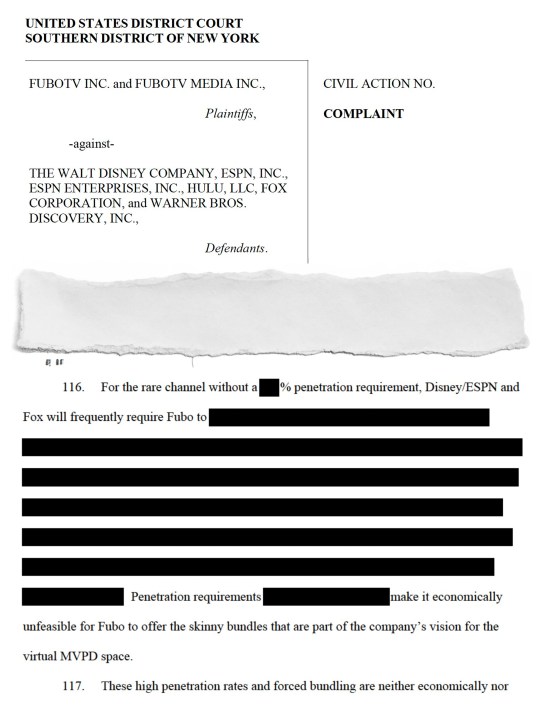
Fubo has poked the bear. Three bears, actually, in filing a federal antitrust lawsuit against an upcoming joint venture (known as a JV for obvious reasons) that sees Disney, Fox, and Warner Bros. Discovery teaming up for a new sports streaming service that is planned to launch this fall.
At first glance, the lawsuit (and its accompanying press release) seems like an offseason Festivus airing of grievances.
“The vertically integrated media companies have engaged in a yearslong campaign to block Fubo’s innovative sports-first streaming business, resulting in significant harm to both Fubo and consumers,” the press release opens. The lawsuit itself has much the same tone as the opening paragraphs that set the stage. And it’s hard not to look at Fubo like it’s the little guy trying to punch up, without a possibility of actually landing a shot.
Not helping matters is when Fubo refers to itself as “a leading virtual MVPD.” That’s short for multi-channel video programming distributor. Whereas cable and satellite are traditional MVPDs, the “virtual” part means that you don’t need any additional infrastructure and can do it all with existing hardware like a phone, tablet, or computer. And in any event, Fubo isn’t anywhere close to leading in 2024. It ended the third quarter of 2023 with 1.477 million subscribers, up 20%t year over year. But it has yet to ever break a million and a half. (Fubo announces its fourth-quarter 2023 numbers on March 1, 2024.)
Meanwhile, YouTube TV (which doesn’t give precise subscriber numbers) recently eclipsed 8 million subscribers. Hulu With Live TV last reported 4.6 million subs. Sling TV is No. 3 at 2.12 million subscribers. So, no. Fubo isn’t anywhere close to leading anything, and it never really has been. But that’s also its point — that its competitors have used their positions to unfairly keep Fubo from gaining any more traction than it has, both in terms of subscribers and revenue. (The company hopes to have positive cash flow in 2025.)
Was Fubo unable to compete? Or was it kept from being able to compete?
And to be clear, Fubo isn’t suing YouTube TV or Google, or Sling. Hulu is included, as is ESPN, because their corporate entity is Disney, which is one third of the joint venture at question. ESPN also plans to have its own standalone streaming subscription sometime in 2025.)
The really important stuff in this lawsuit isn’t the bluster. It’s not Fubo pretending it’s far bigger than it is. It’s not Fubo whining that it was going to offer a skinny bundle — that is, fewer channels and thus a lower price — that focused on sports, only for that to never really materialize, at least over the long run.
Here’s what Fubo really is alleging: Fubo says the defendants sold their programming to its competitors at a lower price than Fubo was offered, or that it was required to do business in a way that kept it from being able to compete.
The details are myriad and complex. Read the full lawsuit if you really want to see how tangled all of this has become — and that’s just for the smallest of the virtual MVPDs. But the details we’re able to see in the lawsuit also are incomplete. Parts of the allegations are redacted. Things like what Fubo is being required to pay for certain content. Or what channels it’s being forced to carry, or what percentage of a particular viewership it’s being required to serve certain channels to.
I have no idea if any (or all) of that is legal. I have no idea what a “fair” price would be for Fubo to pay for, say, ESPN. Should Disney be required to charge YouTube TV and its more than 8 million subscribers the same as it charges Fubo and its 1.4 million subs? At what point does the usual give-and-take in a major business deal cross a line?
And all this, mind you, over a joint venture that doesn’t launch until this fall — and as yet doesn’t even have a publicly known name.
It’s clear that Fubo has been banking on what it believes are unfair practices for a while now. It’s also very likely that it’s playing the part of David against the defendants’ Goliath. We’ll just have to see how the story plays out.
But for now, much of what a judge and, potentially, a jury would need to get anywhere close to a decision remains hidden behind those black bars. It’d be good to remember that before merely repeating what any of the companies has to say about the lawsuit.
Editors’ Recommendations
Services Marketplace – Listings, Bookings & Reviews
